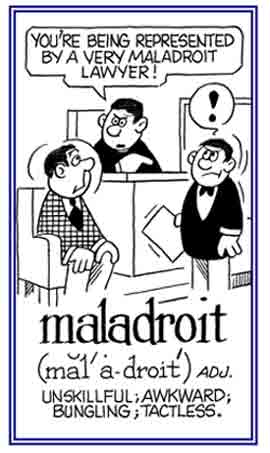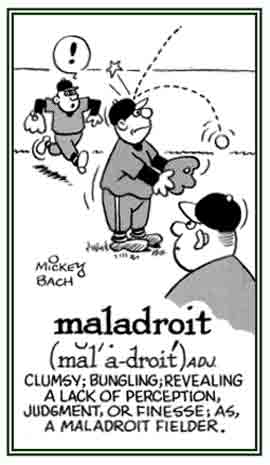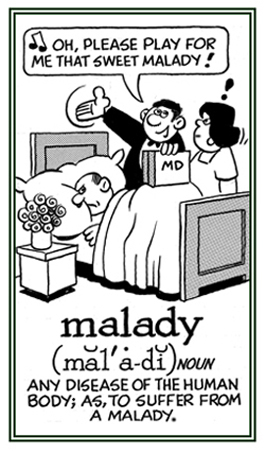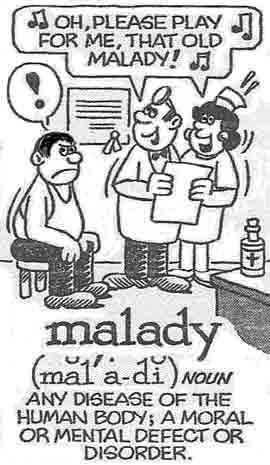grand mal seizure
(s) (noun), grand mal seizures
(pl)
1. A type of epilepsy or a brain disorder in which clusters of nerve cells, or neurons, in the brain sometimes signal abnormally; resulting in the loss of consciousness, generalized muscle contractions, urinary incontinence, tongue biting and a condition with confusion and lethargy following the cessation of the stroke: Linda was subject to
grand mal seizures which presented a risk for her pregnancies; so, she was frequently hospitalized during the months prior to giving birth to each of her children.
Some grand mal seizures may last for just a few seconds or they can continue for several minutes.
2. Etymology: from French
grand mal, "big illness" and is an antonym of another type of epilepsy known as
petit mal, "little illness".
mala fide
(MA luh FIGH dee, MA la FEE di) (adjective), more mala fide, most mala fide
A reference to someone who is acting in "bad faith": When Joe told the potential buyer of his car that his vehicle was in perfect condition, he was making a
mala fide statement with the intention of deceiving the potential buyer because a mechanic told Joe that the motor needed to be repaired.
The robber made a mala fide promise to give the money that he stole back to the bank; however, he never really intended to do it.
mala fide
(adverb), more mala fide, most mala fide
Pertaining to deceiving or to doing something insincerely or dishonestly: The opposition group accused the governor of making mala fide political promises that he knew could not be accomplished.
Mala ultro adsunt. (Latin motto)
Translation: "Misfortune comes uninvited."
Motto of German Emperor Sigmund of Luxembourg (1410-1437).
malabsorption
(s) (noun), malabsorptions
(pl)
Imperfect taking in of food material by the body or inadequate food intake of nutrients, vitamins, or minerals from the intestinal tract: Susan's thinness was caused by
malabsorption because her body was unable to use many of the proteins in the meals which she ate.
Common effects of malabsorption include diarrhea and weight loss; while in severe cases, there may also be malnutrition, vitamin deficiency, mineral deficiency, or anemia (deficiency of red blood cells).
maladjusted
(adjective), more maladjusted, most maladjusted
1. A reference to emotional difficulties, which are unhappy or unsuccessful, because of inability or failure to adjust to life's stresses; marked by depression, anxiety, and irritability:: The school psychologist determined that Sally was one of the most maladjusted children in the school and so she required specialized psychological assistance.
2. Exhibiting, or characterized by, mental or emotional problems: Due to horrific conditions of deprivation in the refugee camp, the maladjusted children received special attention by medical therapists.
maladjustment
(s) (noun), maladjustments
(pl)
Specific mental problems involving the unsuccessful adaptation to one's social environment: The
maladjustments of prisoners after they are released from prison often influence their return to a life of crime.
A maladjustment is common and it can occur at any age as a reaction to some stressful situation; such as, starting school, changing where one has been living for a long time, divorce, physical illness, or even retirement.
Maladjustments are usually temporary and they will clear up when people are removed from the stressful situations or learn to adapt to them.
maladminister
(verb), maladministers; maladministered; maladministering
To execute, or to manage oneself or other situations inefficiently or badly: In political gatherings, Mr. Ross was always afraid of maladministering himself and making inappropriate comments.
maladroit
(s) (noun), maladroits
(pl)
An uncoordinated person; a bungler: As a new ice skater, Bruce's
maladroits resulted in several bruises and a broken wrist.
When her brother said Rebecca was a maladroit, he was referring to her use of a computer for the first time.
maladroit
(adjective), more maladroit, most maladroit
1. A reference to the condition of being awkward and not skillful: The
maladroit helper of the mechanic caused things to become worse instead of finding solutions to the problems that were presented.
The presidential candidate has been criticized for what is considered to be his maladroit remarks about the Olympics in London and for suggesting that Jerusalem was once the capital of Israel among other things.
2. Relating to the instance of being tackless and insensitive in one’s behavior or speech: Ralph's neighbor has a son who is a
maladroit teenager in that he is neither socially, physically, nor mentally skilled, and so he is unaware of what appropriate behavior is.
 © ALL rights are reserved.
© ALL rights are reserved.
 © ALL rights are reserved.
© ALL rights are reserved.
 © ALL rights are reserved.
© ALL rights are reserved.
 © ALL rights are reserved.
© ALL rights are reserved.
Go to this Word A Day Revisited Index
so you can see more of Mickey Bach's cartoons.
maladroitly
(adverb), more maladroitly, most maladroitly
A reference to how someone is uncoordinated or is lacking sufficient knowledge: The governor handled the state budget so maladroitly that it resulted in his being severely criticized by many of his citizens.
maladroitness
(s) (noun) (no pl)
The condition of tactlessness, of being unskilled, or the insensitiveness in behavior or speech: Jeremy's
maladroitness in his sport was a result of his not having enough training or experiences, so he was awkward in his movements.
The politician was often undiplomatic, or bungling, which became the maladroitness that caused him to lose the election because people could not tolerate his incompetent comments.
malady
(s) (noun), maladies
(pl)
1. A specific kind of ill health, an ailment, or a disease: Pete stayed home from school, claiming a
malady which made him want to sleep all day.
2. A morbid or depraved condition; such as, of the mind, social relationships, etc.: Lorna's sister apparently had a
malady that needed some kind of psychological remedy or cure because she was always criticizing or arguing in an angry way with other people.
 © ALL rights are reserved.
© ALL rights are reserved.
 © ALL rights are reserved.
© ALL rights are reserved.
Go to this Word A Day Revisited Index
so you can see more of Mickey Bach's cartoons.
malaise
(s) (noun) (usually no plural)
1. A condition of bodily uneasiness or discomfort; especially, a condition of bodily suffering or lassitude, without the development of any specific disease: Sara's malaise caused her to feel very tired all the time.
2. Discomfort, uneasiness, or indisposition, often indicative of an infection: Jim's malaise seemed to have been caused by working too hard on the chicken farm.
malalignment
(s) (noun), malalignments
(pl)
Improper placement of structures; such as, teeth or the portions of a fractured bone, etc.: Due to the misalignment of her front teeth, Suzy had to wear orthodontic appliances, or braces, for three years.
Inter-related cross references, directly or indirectly, involving word units meaning "bad, wrong":
caco-, kako-;
dys-;
mis-;
pessim-;
sceler-.







